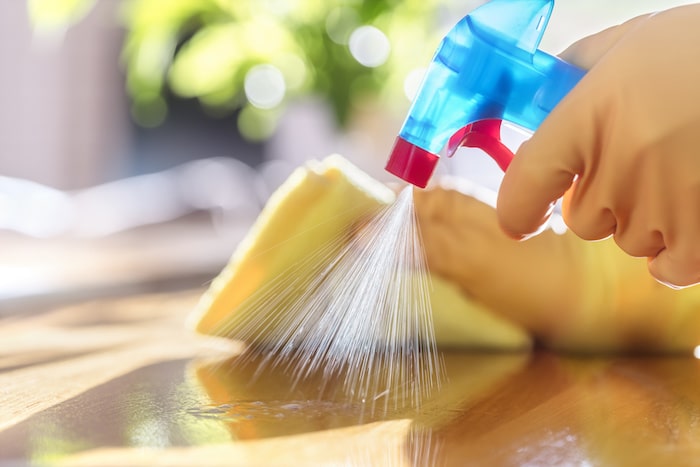With an expected spike in numbers this winter approaching, we’re washing our hands, masking up, and using plenty of hand sanitizer, but what about the potential for viral spread in your own home? How can you protect yourself and your family in your home?
Sanitizing your house is an important step in preventing viral spread. So what should you know about keeping your home sanitized?

Use Approved Cleaning Products—And Use Them Appropriately
Not every cleaning product works the same way. Many green cleaning products are great for ensuring your home looks clean, but when you need cleaning products for sanitizing your house, you need products that are approved to kill the SARS-CoV-2 virus that causes COVID-19.
The Environmental Protection Agency (EPA) has compiled a list of cleaning products to use—the ones that are known to kill the majority of virus particles. When choosing products to sanitize your home, make sure they make the cut.
Next, read the label. Not all products work the same way, and if you’re truly concerned about sanitizing your house, it’s crucial to read the label. Each disinfectant works differently, and many have to come in contact with the virus for a specific amount of time to kill as many virus particles as possible. This time is always listed on the label.
The biggest mistake you can make when disinfecting your home from any kind of virus or bacteria—COVID-19, the common cold, or even conjunctivitis (pink eye)—is wiping the cleaning solution away too soon, before it has time to work. This limits the ability of the cleaning agent to kill the germs. Before you begin sanitizing your house, check the products you’re using, then check the label and stick to the contact time before you dry things off.
Take Care of High-Touch Surfaces that Can Spread Illness
We know more now about how COVID-19 spreads than we did at the beginning of the pandemic and that it mainly spreads through the air, but we do know that it is still possible for the virus to spread by touching a contaminated surface. The CDC states that:
“It may be possible that a person can get COVID-19 by touching a surface or object that has the virus on it and then touching their own mouth, nose, or possibly their eyes, but this is not thought to be the main way the virus spreads.”
While this isn’t the primary way the virus spreads, you can still take precautions by sanitizing these high-touch surfaces in your home with the proper disinfectants:
- Cupboard and drawer pulls in the kitchen and bathrooms
- Faucets and handles
- Kitchen and bathroom counters and desk and table surfaces
- Toilets
- Refrigerator, dishwasher, and microwave handles, panels and buttons
- Remote controls, laptops, and game controllers
- Cell phones, tablets, e-readers, and other mobile devices
- Keyboard and computer mouse
- Doorknobs
- Stair railings
- Light switches
For smaller electronics, some Floridians are even opting to use UV-C light devices for disinfection. Business Insider recommends this Electronics Sanitizers, which can hold two phones (or remotes, controllers, and more) at once and safely kills bacteria in only 10 minutes.
Clean and Sanitize the Bathrooms
There’s evidence to show that bathrooms are major areas that can enable the virus to spread. This means that it’s important to regularly sanitize all the surfaces in your bathroom. You should wipe down all hard surfaces in your bathrooms, including the sinks and faucets, as well as the toilet, tub, shower, shower head, and shower curtain.
You should also sanitize the items in your bathroom that are frequently touched, like hairdryers, electric trimmers, toothbrushes, and other hard surfaces that can host the virus. Additionally, if you suspect that someone in your family is sick, they should not only quarantine alone but also use a separate bathroom if possible.
Sanitize the Kitchen
We touch so many surfaces in our kitchen each day, which means your kitchen is also a prime area for the virus to spread. What should you do to disinfect your kitchen?
- Sanitize countertops and food prep areas. You should either use a food-safe disinfectant or rinse the disinfectant away before preparing food.
- Clean all hard surfaces and handles with an approved disinfectant, paying extra attention to the fridge inside and out as well.
- Disinfect all dishes, glasses, and utensils in the dishwasher at a temperature 140° Fahrenheit or higher, or soak hand-washed dishes in a germicidal bleach solution before giving them an extra wash and rinse with soap and water.
Other Essential Cleaning Tips
The Centers for Disease Control (CDC) recommends the following procedures for your home if someone in your home is sick:
- Wear disposable or reusable rubber gloves for when cleaning and disinfecting
- Clean surfaces using soap and water first, then follow up with an approved sanitizing product
- Wash clothing, towels, and bed linens according to the label at the highest possible water temperature
- Wash your hands thoroughly with soap and water for at least 20 seconds
- If someone is sick, have them keep a separate bedroom and bathroom if possible
Providing Exceptional Cleaning for Our Florida Neighbors
We’re all balancing a lot right now. Working from home, helping kids with their virtual learning, or maybe you’re a teacher being asked to teach in unthinkable circumstances, or an essential worker logging long hours to keep our communities healthy and safe. Perhaps it’s time for recurring house cleaning from a professional cleaning service that cares—a service like Mops & Buckets.
At Mops & Buckets, we can take care of your everyday household cleaning tasks so you have more time to balance all that’s being asked of you during this unprecedented pandemic. We have the residential weekly and biweekly house cleaning services, to help you sanitize your house.